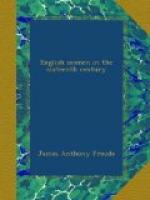‘Your mariners,’ said De Silva to her, ’rob our subjects on the sea, trade where they are forbidden to go, and fire upon our ships in your harbours. Your preachers insult my master from their pulpits, and when we remonstrate we are answered with menaces. We have borne so far with their injuries, attributing them rather to temper and bad manners than to deliberate purpose. But, seeing that no redress can be had, and that the same treatment of us continues, I must consult my Sovereign’s pleasure. For the last time, I require your Majesty to punish this outrage at Plymouth and preserve the peace between the two realms.’
No remonstrance could seem more just till the other side was heard. The other side was that the Pope and the Catholic Powers were undertaking to force the Protestants of France and Flanders back under the Papacy with fire and sword. It was no secret that England’s turn was to follow as soon as Philip’s hands were free. Meanwhile he had been intriguing with the Queen of Scots; he had been encouraging Ireland in rebellion; he had been persecuting English merchants and seamen, starving them to death in the Inquisition dungeons, or burning them at the stake. The Smithfield infamies were fresh in Protestant memories, and who could tell how soon the horrid work would begin again at home, if the Catholic Powers could have their way?
If the King of Spain and his Holiness at Rome would have allowed other nations to think and make laws for themselves, pirates and privateers would have disappeared off the ocean. The West Indies would have been left undisturbed, and Spanish, English, French, and Flemings would have lived peacefully side by side as they do now. But spiritual tyranny had not yet learned its lesson, and the ‘Beggars of the Sea’ were to be Philip’s schoolmasters in irregular but effective fashion.
Elizabeth listened politely to what De Silva said, promised to examine into his complaints, and allowed Hawkins to sail.
What befell him you will hear in the next lecture.
LECTURE III
SIR JOHN HAWKINS AND PHILIP THE SECOND
My last lecture left Hawkins preparing to start on his third and, as it proved, most eventful voyage. I mentioned that he was joined by a young relation, of whom I must say a few preliminary words. Francis Drake was a Devonshire man, like Hawkins himself and Raleigh and Davis and Gilbert, and many other famous men of those days. He was born at Tavistock somewhere about 1540. He told Camden that he was of mean extraction. He meant merely that he was proud of his parents and made no idle pretensions to noble birth. His father was a tenant of the Earl of Bedford, and must have stood well with him, for Francis Russell, the heir of the earldom, was the boy’s godfather. From him Drake took his Christian name. The Drakes were early converts to Protestantism. Trouble rising at Tavistock on the Six Articles Bill,




